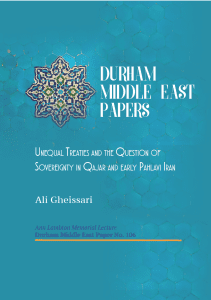Unequal Treaties and the Question of Sovereignty in Qajar and early Pahlavi Iran
By Ali Gheissari
 BIPS is delighted to share the news of the publication of Unequal Treaties and the Question of Sovereignty in Qajar and early Pahlavi Iran by Professor Ali Gheissari in the Durham Middle East Papers series.
BIPS is delighted to share the news of the publication of Unequal Treaties and the Question of Sovereignty in Qajar and early Pahlavi Iran by Professor Ali Gheissari in the Durham Middle East Papers series.
Since the 1970s, the DMEPs publish papers on all aspects of the social sciences and arts in the Middle East. Unequal Treaties and the Question of Sovereignty in Qajar and early Pahlavi Iran is the latest addition to the series and it is based on the paper delivered by Professor Gheissari at the Ann Lambton Memorial Lecture 2022.
The full paper can be downloaded here.
You can watch Ali Gheissari’s Ann Lambton Lecture on the BIPS YouTube channel or you can listen to the podcast on our website.
Abstract
The present survey will be an overview of the Russian and British leverage in Iran during the Qajar and early Pahlavi periods through unequal treaties as one channel of extending their imperial influence and counterbalancing each other’s rival presence. Although Iran was never directly colonized, on several occasions its sovereignty was compromised by competing foreign interests as reflected in a number of unequal treaties and concessionary agreements which, in effect, created a semicolonial situation for the country during the nineteenth and early twentieth centuries. The essay will attempt to address certain aspects of the above observations in three interrelated sections.
The first section will provide a general discussion on unequal treaties, notably the Golestan Treaty of 1813 and the Turkmenchay Treaty of 1828 between Russia and Iran, and their implications. Subsequently, the Qajar state’s traditional perspective on sovereignty and its ways of maintaining it and Iran’s semicolonial condition in the nineteenth and the early twentieth centuries will be discussed in the second section. Finally, by building on modern requisites of sovereignty based on the paradigm of nation-state and by introducing a number of corresponding legal and administrative reforms that were initiated in late 1920s and early 1930s, the early Pahlavi state set out to remove hitherto capitulatory agreements, a topic that will be briefly addressed in the last section.
Ali Gheissari studied Law and Political Science at Tehran University and History at St. Antony’s College, Oxford. He has taught History and Political Science at the University of San Diego and has also held visiting appointments at the University of California, Irvine, Brown University, and St. Antony’s College, Oxford. He has written extensively in Persian and English on the intellectual history and politics of modern Iran and on modern philosophy and social theory.